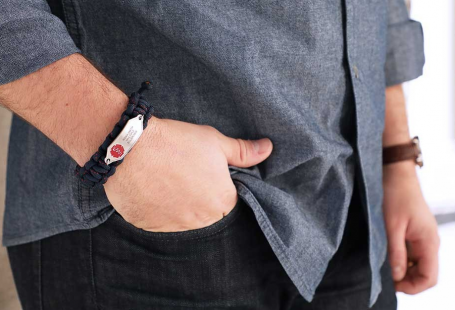Autism is a complex developmental disability that typically appears during childhood and can impact social skills, communication, relationships, and self-regulation.
Children with autism have a tendency to wander and struggle to communicate with others. If a child with autism becomes lost, they may be unable to communicate their name, address, or phone number.
Autism is an invisible disorder and first responders may not recognize the condition in an emergency. Medical IDs are important to alert emergency personnel that a person has autism so that they can receive appropriate care in an emergency or get help finding their way home.
What is Autism?
Autism, or autism spectrum disorder (ASD), is a broad range of conditions characterized by challenges with social skills, repetitive behavior, speech, and nonverbal communication. People with ASD may also have different ways of learning, moving, or paying attention.
Autism affects an estimated 1 in 36 children in the United States today. Since autism is a spectrum disorder, symptoms can range from mild to severe. Some people with ASD may require significant help in their daily lives while others can live independently.
Signs of autism may include:
- Repetitive behaviors such as flapping hands, rocking body, or spinning in circles
- Unusual reactions to the way things sound, smell, taste, look, or feel
- Getting upset by minor changes
- Playing with toys the same way every time
- Repeating words or phrases
- Must follow certain routines
- Hyperactive, impulsive, and/or inattentive behavior
- Delayed milestones such as language, movement, cognitive, or learning skills
How to order a medical ID for a child with autism
The engraving on a medical ID for autism should include the critical medical information that first responders need to know in an accident or emergency. The most common things to engrave on a medical ID for autism include:
- Personal information: medical IDs should include the full name of the wearer
- Medical conditions: include Autism and any other relevant conditions
- Medications: list any medications your child is taking
- Allergies: list any allergies your child has to medications, food, or insects
- Medical devices: list any medical devices that your child has, such as a pacemaker, epipen, or inhaler
- Communication challenges: list any challenges to communication that child has, such Non-Verbal, so that first responders know why child may not respond as expected
- Equipment or assistance needed: if your child needs equipment such as crutches or a wheelchair or if they need physical help with mobility it should be listed on the medical ID
A medical ID is a small investment for the peace of mind of keeping your child safe during an emergency. If you have a child with autism, order a medical ID today to ensure that your child gets the best care if in an emergency or lost.





